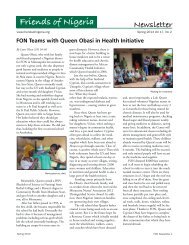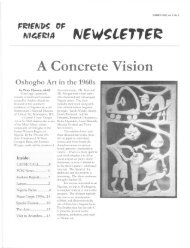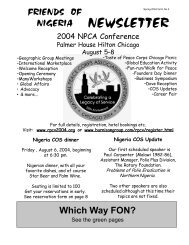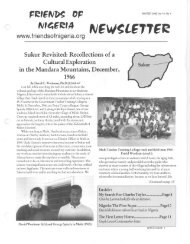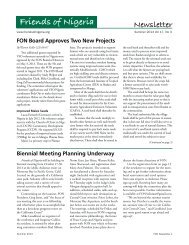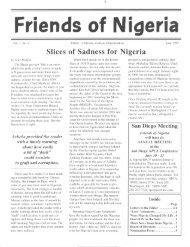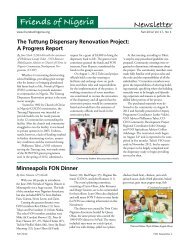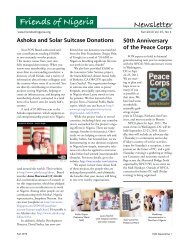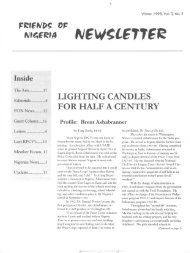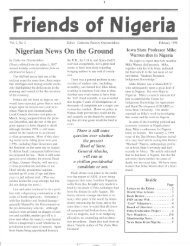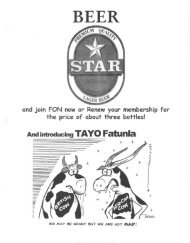NEWSLETTER - Friends of Nigeria
NEWSLETTER - Friends of Nigeria
NEWSLETTER - Friends of Nigeria
You also want an ePaper? Increase the reach of your titles
YUMPU automatically turns print PDFs into web optimized ePapers that Google loves.
Wong’s Recollections ...<br />
(Continued from page 13)<br />
they somehow knew that this did not bode well. Free love had to<br />
lead to something worse, like television.<br />
Presbyterianism and a goat sacrifice<br />
One day the usual crowd on the porch was small. Time to clear<br />
and plant, I was told. That was the busiest time for men. Men<br />
cleared the bush, burned away the underbrush, tilled the soil, and<br />
planted the yams. The quotidian work, such as weeding and<br />
tending, was done by women. The men returned to the fields at<br />
the end <strong>of</strong> the planting season to harvest.<br />
A week or two later was the ceremonial day for the “blessing”<br />
<strong>of</strong> the planting. Ohafia was nominally Presbyterian. I had been<br />
raised a Presbyterian and I knew what that meant - the proceedings<br />
would be kind <strong>of</strong> dry, low key, and dull. I was wrong.<br />
We all went out to the edge <strong>of</strong> the bush where it appeared that<br />
everyone in town had gathered. Everyone was in a festival mood.<br />
But when the actual ceremony started, it was plain to me that this<br />
was serious. A bare-chested young man in traditional Ohafia<br />
warrior garb, carrying a machete, was being feted in a manner I<br />
knew nothing about. After the ceremony that involved a lot <strong>of</strong><br />
speechifying and the laying on <strong>of</strong> hands, he was sent out to the<br />
bush with a goat, the cheers <strong>of</strong> the crowd following his every step.<br />
We waited. I was told that if we heard three drum beats it<br />
would mean that the head <strong>of</strong> the goat was severed completely<br />
with one cut and that the growing season would be good.<br />
As I stood in the crowd, an old man in front <strong>of</strong> us turned and<br />
looked at me with what I thought to be more than curiosity. He<br />
then talked to his friend standing next to him in a fairly loud voice.<br />
Uduma explained that he was questioning why I, a Beke, was at<br />
the ceremony. He complained that it was the white people, after all,<br />
who had ruined the ceremony in the first place. After the<br />
missionaries had come, the traditional sacrifice <strong>of</strong> a member <strong>of</strong> the<br />
Udo - a sort <strong>of</strong> pariah class among the Igbo - had been stopped,<br />
and a goat had been introduced in their stead. The old man<br />
remembered with chagrin. This was Presbyterianism unlike any I<br />
had ever seen.<br />
Dr.’s house on top <strong>of</strong> the hill<br />
Dr. Ogbenna had built, in honor <strong>of</strong> his own success I<br />
suppose, a huge, walled compound just a half mile up the road<br />
on the cross street. One day the hot sticky peace <strong>of</strong> the afternoon<br />
was shattered when a huge Caterpillar rolled into town and<br />
immediately began its duties by knocking down the few remaining<br />
palms next to the dirt road and smoothing out the ground. It was<br />
bright yellow and moved lumberously but purposefully. Half the<br />
children in the town followed its every move laughing and<br />
shouting at this powerful godlike creature, “Ca Ta Pi Lo”.<br />
It was obvious; the road to Dr. Ogbenna’s house was to be<br />
paved. Everyone on the porch laughed uproariously at the<br />
corruption and influence that would allow one to have the<br />
government build a road to your house. Dr. Ogbenna, as a doctor,<br />
a “been to”, and a government <strong>of</strong>ficial, was the most influential<br />
member <strong>of</strong> Ebem society. If he wanted a paved road to his house,<br />
he could damn well have it.<br />
Dreams<br />
The second most influential man in town, Igwe Okaha Igwe,<br />
showed up one day. He was really just walking by and since<br />
everyone on the porch knew him, as principal and as a famous beer<br />
drinker, he was called up to the porch and a place was made for<br />
him. Mr. Okaha, as I called him because I was merely a teacher in<br />
his school, frequently wore a tie and was also perhaps the most<br />
distinguished looking man in town. He was one <strong>of</strong> two or three<br />
men in town who had been overseas to be educated. He could<br />
laugh and joke, but it was always with a serious, distinguished air.<br />
He nodded to me and made some kind <strong>of</strong> comment about<br />
finally understanding why my lectures were so obtuse and turned<br />
to the rest <strong>of</strong> the group. He started in with his usual conversation<br />
about how things are in Detroit where he had lived as a student.<br />
Everyone had heard it all before but listened politely until he<br />
moved over to what had happened at the faculty meeting that day.<br />
Miss Chineke, a math teacher, had disrupted the whole meeting<br />
when she called out to the other math teacher and said, “I don’t<br />
like what you did to me in my dream last night,” and further went<br />
on to demand that he stay out <strong>of</strong> her dreams in the future and<br />
what she was going to do if he didn’t. Much laughter erupted on<br />
the porch as Mr. Okaha described the momentary chaos in his<br />
faculty meeting.<br />
I was told later in an aside that Mr. Ubamadu, the other math<br />
teacher, was well known for doing that kind <strong>of</strong> thing. After all, it<br />
was explained, she was 27 years old - well past the age <strong>of</strong> marriage<br />
for women - and for him to come visit her in her dreams was<br />
reasonable. (Mr. Okaha later wrote a book <strong>of</strong> memoirs. I got a nice<br />
mention on page 127, if you care to look.)<br />
An airplane went over<br />
One day a small airplane flew over at a fairly great height. You<br />
could hear the engine but the plane appeared to be very small -<br />
perhaps a Cessna. The porch emptied quickly as everyone went out<br />
into the street to catch a glimpse. An airplane flying over was an<br />
event worth emptying the porch for. After the small plane<br />
sputtered its way across the sky it was back to the porch for beer<br />
and talk about the wonders <strong>of</strong> technology. Kalu mentioned that<br />
he had once been to Lagos and had seen real airplanes up close.<br />
<strong>Nigeria</strong> Airlines had one 737 painted green on one side with<br />
“<strong>Nigeria</strong> Airlines” and on the other side was blue with “Pan<br />
American World Airways.” It was always parked with the green<br />
side toward the terminal. An airplane, flying or grounded, was still<br />
a grand sight.<br />
We looked in the direction the plane had flown. It went <strong>of</strong>f<br />
toward Arochukwu, another Ohafia town down the road where<br />
the pavement ended. Arochukwu was a town well known for two<br />
things, its warriors and its uncircumcised women. I wish I had<br />
something to say about the latter but I was a Peace Corps<br />
Volunteer. We were told we were ambassadors for America.<br />
14 FON <strong>NEWSLETTER</strong> www.friends<strong>of</strong>nigeria.org



